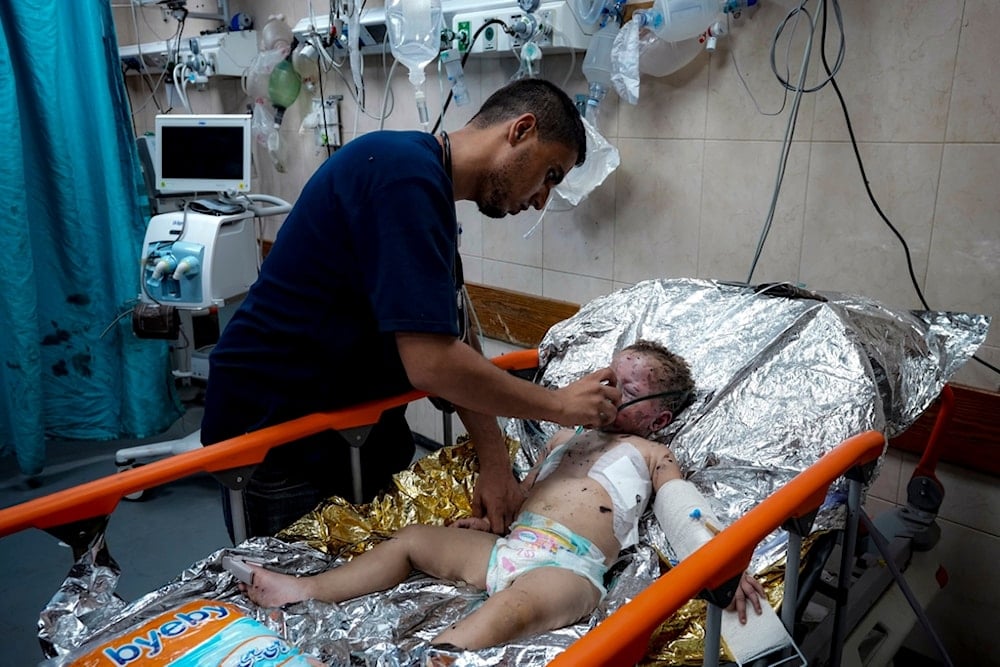Gaza government urges ceasefire amid polio vaccination campaign
The government in Gaza is urging for a ceasefire to allow a widespread vaccination campaign to combat polio.
-

Palestinian Child Siwar Abdel-Hadi, 2, wounded in the Israeli bombardment of the Gaza Strip, receives medical treatment at a hospital in Deir al-Balah, Wednesday, July 24, 2024 (AP)
The Government Media Office in Gaza has emphasized the critical importance of the ongoing polio vaccination campaign, describing it as "essential and urgent," and has called for an immediate ceasefire to ensure its success.
The government institution condemned the Israeli occupation for creating the dangerous environment that has led to the outbreak of polio in the Gaza Strip.
The Media Office held the Israeli occupation and the United States fully responsible for "the dire reality faced by children in Gaza." It urged the international community and all relevant organizations to exert pressure on Israel to "stop this dangerous harm against children."
Foreign Policy underscored that the outbreak of the polio virus in Gaza is a reflection of the catastrophic public health conditions caused by the Israeli occupation. The magazine warned that this situation has placed hundreds of thousands of Israelis at risk of infection.
The magazine highlighted that the polio virus strikes suddenly, paralyzing limbs and even lungs in some cases. The virus is so contagious that a single diagnosis often indicates that hundreds more are simultaneously spreading this "incurable disease."
Although the disease has dissipated in developed countries, it poses a risk for the Israeli regime due to its ultra-Orthodox, or Haredim, population that is generally opposed to vaccinations, leaving around 175,000 children vulnerable to the illness.
The Haredim make up 17% of Israeli Jews and Prime Minister Benjamin Netanyahu needs their support to maintain his power. Essentially, his government has exempted the group from immunization programs against various vaccine-preventable ailments and viruses, including polio, COVID-19, and influenza, despite their threat to domestic and global health.
Vaccination exemptions and Netanyahu's refusal to implement a permanent ceasefire to end the occupation's ongoing aggression in Gaza have put "Israel" at risk of contracting polio.
Issues with the three-day humanitarian pause, vaccination campaigns
The Israeli occupation (IOF) and Palestinian Resistance movement Hamas have agreed to three separate, localized three-day ceasefires in the Gaza Strip to enable the immunization of around 640,000 children against polio, WHO official Rik Peeperkorn announced on Thursday.
Despite the temporary halt on Israeli aggression to carry out vaccination campaigns, Foreign Policy stated that it is unlikely parents would risk bringing their children to the designated vaccination sites while the occupation continues to carry out its genocide in other areas in Gaza. Additionally, the aggression prevents healthcare workers in Gaza's displaced population from obtaining the necessary vaccinations to combat the outbreak.
Shortly after the detection of the poliovirus in Gaza's sewers, the Israeli government launched a vaccination campaign for IOF soldiers returning from the Strip. However, despite these optional shots protecting some soldiers from contracting the virus, this did not prevent them from spreading the disease in "Israel," turning them into carriers of the deadly, contagious disease.
Foreign Policy speculated that a potential polio outbreak in "Israel" may provide Netanyahu with a strong incentive to establish prolonged humanitarian pauses to carry out mass vaccination initiatives that may lead to a permanent ceasefire.
An ideal mass vaccination campaign is a viable solution to stop the spread of the polio virus.
The World Health Organization (WHO) has pledged 1.6 million vaccine doses in Gaza, some of which have already arrived. However, in order to ensure mass vaccination, aid organizations must find an approach to hold campaigns during an ongoing genocide.
According to Foreign Policy, the most successful polio vaccination campaigns are dependent on door-to-door visits. However, this system would be ineffective due to the destruction of more than 80% of buildings in Gaza.
Essentially, prolonged humanitarian pauses allowing vaccination campaigns could contain the transmission of the virus in Gaza and over 100,000 unvaccinated and under-vaccinated settlers.

 4 Min Read
4 Min Read










